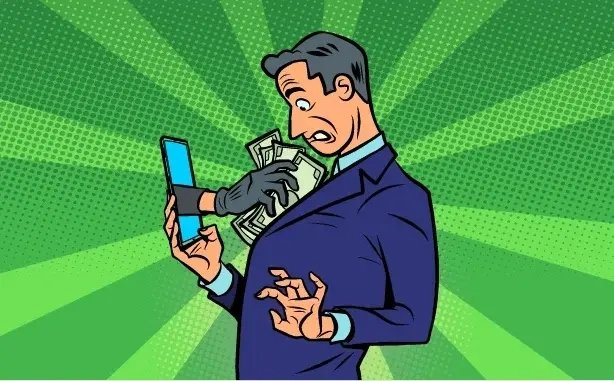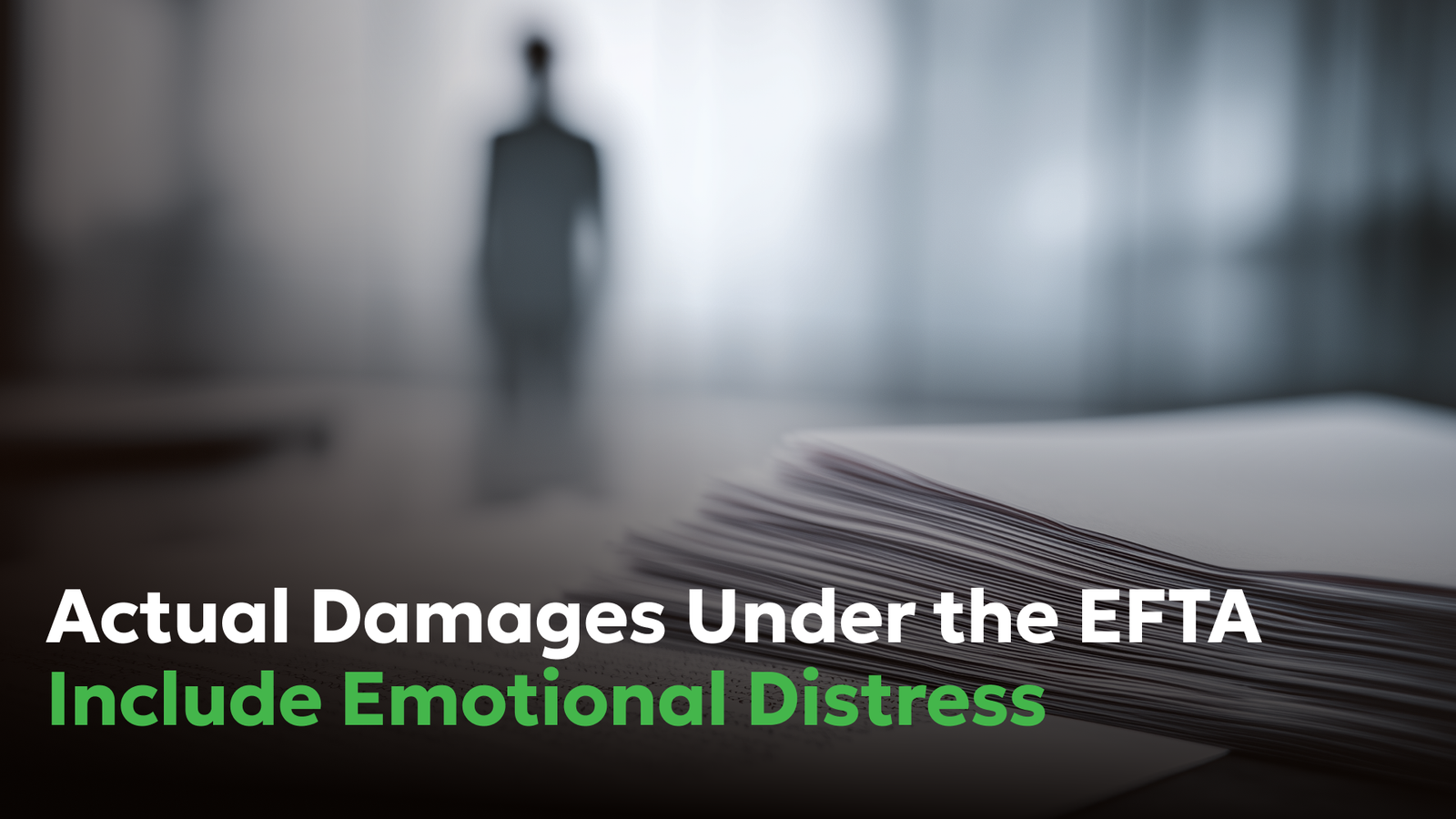EFTA (Electronic Fund Transfer Act) Lawyers

If Unauthorized or Fraudulent Electronic Transactions Impact Your Bank Account, You Need Our Help!
If you’ve had the experience of being ripped off, violated, or subject to any form of unauthorized electronic transaction that is directly tied to your bank account or other financial account (such as a retirement account), then you need a fraudulent transfer lawyer.
Unfortunately, there are many ways that these types of fraudulent electronic money transfers happen. Someone can swindle you out of money through Zelle, PayPal, Venmo, or CashApp. A service provider can keep charging you subscription fees after you cancel the service. You can get held up at an ATM and forced to withdraw money. Someone might find or steal your debit card and use it to make unauthorized transactions. Your own bank can take unauthorized fees from your account. A retailer can charge you multiple times for a single transaction. You can be the victim of identity theft in which someone electronically transfers money from your savings, checking, retirement, or other accounts.
Much of this type of fraud (like robbery at the ATM) constitutes a crime. Some are not necessarily criminal but are considered unscrupulous (like unauthorized overdraft charges at the bank). Regardless, federal and state laws are in place to help protect consumers who fall victim to this type of fraud. One of the key pieces of legislation is the Electronic Funds Transfer Act (EFTA).
At Consumer Attorneys, our nationwide team of highly skilled and experienced consumer protection lawyers has helped thousands of people recover from consumer financial fraud, reporting errors, and other unfair and unjust treatment at the hands of others. With over seventy-five years of combined experience, we can help you, too.
First, keep reading to learn about this type of fraud. I’ll explain the EFTA, how it helps you, what to do if you experience consumer financial fraud, and why working with a fraudulent transfer attorney from our firm is the best way to protect yourself.
Second, contact us to schedule your free consultation with a fraudulent transaction attorney. Let’s discuss how our lawyers can serve you in the aftermath of this fraud and get you back to optimal financial and emotional health.
What is EFTA?
The Electronic Funds Transfer Act (EFTA) is important federal legislation that regulates the transfer of money electronically by directly debiting a consumer account. This includes things such as:
- Swiping, tapping, or insertion of bank cards at the point of sale.
- ATM transactions.
- Direct deposits.
- Auto Pay through service providers.
- Person-to-person (aka peer-to-peer or P2P) transactions through the use of money apps like Zelle, Venmo, CashApp, and others.
- Online and over-the-phone payments.
- Electronic check conversion.
The key theme with these transactions is that they are electronic and directly tied to the transfer of money from a consumer bank or other financial account, as opposed to using a credit card or line of credit. Any electronic transaction, whether via phone, online, or app, that is directly linked to a bank or other account with actual funds is covered by this law.
Transactions relying on the use of credit are regulated under separate legislation, as are wire transfers, paper checks, and prepaid cards.
Banks and third-party companies that provide online and app-based platforms for Peer-to-Peer transactions are subject to regulation under the EFTA.
What To Do If You Have Experienced Consumer Financial Fraud
If you experience or suspect you have experienced consumer financial fraud, such as unauthorized debit card charges, you will need to do the following important things:
- Notify the bank or financial institution immediately. As soon as possible, and within 60 days from the date on the account statement on which the fraudulent charges are posted, you must dispute with the bank directly all of the fraudulent charges. Under the EFTA, you can dispute the fraudulent charges and provide notice of fraud via telephone, email, mailed letter, or in person at a local branch (if available). Note, a written dispute, whether by email or letter is always the best way to preserve evidence of your dispute. Your right to reimbursement for unauthorized charges is directly tied to the speed at which you report the fraud. (See below, “Consumer Rights Under the EFTA,” for more information.)
- Before contacting the bank, review your account statement for the account on which you noticed the fraud. Identify any instance of unknown, unauthorized, or confusing entries. Look at the details like store names, dates, locations, amounts, etc.
- Take notes during or immediately after your conversation to preserve your understanding of what they tell you about the next steps, your rights, their actions, etc.
- If you have been the victim of forced withdrawals from an ATM or other financial account, you should notify the bank of this fraud, but also notify the police immediately.
- If the fraud involves the use of a Peer-to-Peer (P2P) app or online platform, such as PayPal, Zelle, Venmo, or similar, notify them immediately as well.
- File a written confirmation of the dispute by certified mail. Though your initial contact with the bank or other financial institution will serve to inform it of the charge dispute and initiate a fraud investigation, we highly recommend following up with a detailed written dispute letter, including documentation. Send everything via certified mail.
- Your letter should state that you are writing to dispute certain transactions on your account statement(s) and that you have reported these transactions as fraud via phone, email, or in person. Note the name of the person you spoke with (or addressed your email to), the date of the interaction, and what was said.
- Be sure to clearly identify which transactions you dispute as fraud. Include the dates of the statements and all identifying information about the transactions, such as dates, locations, amounts, and items or services purchased.
- It helps to include a copy of the account statement(s) that contain the fraudulent transactions - be sure to circle, underline, or highlight the fraudulent transactions. Providing this alternate method of identifying fraud transactions is helpful to ensure clarity.
- Review your credit reports. We recommend conducting a review of your credit reports at all three credit bureaus (Experian, Equifax, and TransUnion) and placing a fraud alert on each. You can set a fraud alert online or by phone using the number provided on the website for each credit bureau.
- Importantly, you are entitled to a weekly free copy of your credit report from each credit bureau. We recommend regularly reviewing your credit reports. There are three ways to request a copy: online at annualcreditreport.com, by phone at 877-322-8228, or by mailing a request form, which can be printed at annualcreditreport.com. Online requests should only be made through the above government-verified site.
- A fraud alert on your credit reports just signifies to lenders who access your credit report that additional verification is needed prior to running a hard credit check or extending credit to someone purporting to be you.
- Review statements for other credit cards and banking or financial institutions for fraud. Identify any fraud and follow the procedures to notify the companies and dispute the charges. See our article on disputing credit card charges and your rights under the Fair Credit Billing Act for credit fraud.
- File a police report. Depending on the nature and extent of the criminal activity, you may need or want to report this fraud to the appropriate authorities. See “Criminal Prosecution” below for more information.
- Contact a lawyer. You can contact lawyers like those at Consumer Attorneys anytime during this process. While it may seem straightforward, several federal and state regulations heavily influence your rights, and working with a lawyer who knows the legal landscape will make the entire process better for you.
Legal guidance throughout the process is incredibly helpful, and working with debit card fraud lawyers is the best approach.
What Do Fraudulent Transfer Lawyers Do?
Depending on the type of financial fraud you experience, you may search for us online by any number of different names, such as fraudulent transfer lawyers, debit card fraud attorneys, PayPal fraud lawyers, or others. Regardless of your search terms or specific needs, at Consumer Attorneys, our lawyers can help.
This is because our lawyers practice in the areas of the law that attempt to balance the power dynamic between the consumer and the corporate entities that hold a wildly disproportionate share of the power in every interaction, exchange, and transaction. If you’ve been victimized, our lawyers for debit card fraud can help.
- An EFTA lawyers offer legal guidance and advice on your rights under the EFTA and any other relevant federal and state legislation. Since we’re a nationwide firm, our lawyers know how your state laws intersect with and complement your protections under the EFTA.
- Our lawyers help you enforce the bank or other financial institution's obligations under the law, including knowing when and how the various statutory time periods are triggered.
Our lawyers will advise you on when it is time to file a lawsuit. We’ve been handling cases involving fraudulent debit card charges and other types of consumer financial fraud for a long time.
We know all of the stalls, delays, and dead-ends that people hit along the path to recovery. For instance, shoddy or inadequate investigations may result in a bank or other institution simply confirming the fraud transactions as authorized, even though you know they are fraud.
When you’re already dealing with the trauma of discovering you’ve been financially violated but end up also having to fight the banks and financial institutions to do the right thing and uphold the law, you want a skilled, experienced, and knowledgeable lawyer on your side.
If financial fraud ends up creating credit problems, missed payments, debt collections, and other related harms, our lawyers help with all of that, too! As comprehensive consumer protection lawyers, the team at Consumer Attorneys are not just lawyers against debit card fraud; we’re also credit reporting lawyers, debt collection harassment lawyers, and every other kind of lawyer you need to stay whole and financially healthy during this type of ordeal.
When you need an attorney for debit card fraud and all of the related problems that arise, we’re your greatest ally.
Consumer Rights Under the EFTA
The Electronic Funds Transfer Act (EFTA) affords a somewhat limited, though significant, selection of rights for people who engage in electronic financial transactions using various modalities (phone, online, app, point-of-sale). Many people in the United States fall into this extremely broad category. Under the EFTA, consumer financial fraud is regulated through the following:
- Banks and other financial institutions are required to keep account holders fully informed of all fees associated with various transactions involving their accounts. This can include transaction fees, ATM fees, overdraft fees, etc.
- Banks and other financial institutions must limit the amount of daily withdrawals from your account. If you use ATMs, you’re likely familiar with this as the $300/day limit on most ATM withdrawals. This is meant as a layer of harm reduction in light of fraud.
- Banks and other financial institutions are required to keep account holders fully informed of their right to dispute charges or withdrawals and provide contact information regarding where and how to file a dispute.
- Notably, the EFTA is very liberal as far as fraud notification goes. So, you can report fraud via phone, email, or even in person at your local bank.
- You have 60 days from the date on the account statement on which the fraudulent charges are posted to dispute unauthorized charges. This is absolutely critical. Under the law, you are responsible for reporting and disputing fraud charges within this window.
- The amount of financial protection you receive is directly tied to how quickly you report the transactions you believe to be fraud.
- If you report the transactions within 2 days from the date on the account statement, you are not liable for any transactions resulting from fraud that post after the date of your report, and your liability for any financial loss is limited to $50.
- If you report the transactions greater than 2 days from the date on the account statement but within the 60-day window, your liability for the fraud is capped at $500, but you most likely will not even be expected to absorb this $500 loss.
- If you report the transactions after the 60-day window, the bank or other financial institution does not have to investigate the disputed withdrawals, and you may be expected to absorb the entire loss for the fraud. This means you will not be reimbursed for any of the transactions, even if they resulted from theft or fraud.
- Banks and other financial institutions must investigate the disputed transactions within 10 business days of receiving fraud notice and must notify you of the outcomes within 3 days. There are some exceptions to these time limits, but typically these apply.
- Banks and other financial institutions must credit the money back to your account (put the money into your account).
Criminal Prosecution
Many consumer financial fraud activities amount to crimes. As you know, the EFTA does not regulate the criminal prosecution of these activities. If you are the victim of an activity that constitutes a financial crime, such as a forced bank or ATM withdrawal, identity theft, or unauthorized use of a stolen bank card, you should report these crimes to the appropriate authorities. Your local police, the state Attorney General’s office, and the Consumer Financial Protection Bureau are good places to start exploring the pursuit of criminal prosecution against the perpetrator.
Consumer Financial Fraud Not Covered Under the EFTA
We note that plenty of people still do not have adequate access to bank, checking, retirement, or other financial accounts. For the latter, using prepaid cards, wire transfers, and paper check cashing is more common. Unfortunately, fraud is still a persistent problem plaguing people who rely on these types of transactions, but it does not fall under the purview of the EFTA.
If you’ve been victimized by fraud involving the use of pre-paid cards, wire transfers, and paper check cashing, we recommend pursuing justice through the criminal system by filing a report with the State Attorney General’s Office, the Federal Bureau of Investigation, and the Federal Trade Commission.
Trust Our Attorneys Who Work Under the EFTA
At Consumer Attorneys, consumer protection is what we do. We are litigators and advocates who fight for your rights against the outsized, incredibly powerful banking and financial industry players who constantly put their best interests ahead of yours. When you need a lawyer against debit card fraud, one of our team members can help.
We are legally and ethically obligated to serve you, our clients. All of our actions, guidance, and advice is meant to optimize your recovery and your outcome.
And under the EFTA, if we file a lawsuit against banks or other financial institutions for violations of their legal obligations to you, they have to pay all of your fraudulent transfer attorney’s fees and costs when we win.
Plus, we have the added power of being a nationwide firm. This means that no matter where you’re living or wherever you’ve been harmed, we can help. From coast to coast, we’re wherever you need us to be.
Fraudulent Transfer Attorney’s Fees
If you somehow missed it elsewhere in this article, know that you pay nothing out-of-pocket for our legal services in bringing a lawsuit under the EFTA. There is zero out-of-pocket cost to you!
How can this be?
First, we charge nothing for our initial legal consultation with you. It is now, and always has been, 100% free. We know that you won’t necessarily know whether you need a lawyer until you talk to a lawyer. So, we invite you to call or contact us today to schedule your free consultation.
Second, one of the ways that the EFTA seeks to protect people in this situation is to make the bank or other financial institution pay for your attorney’s fees and costs when you successfully sue for EFTA violations. This is because making you pay to enforce the laws that should have been upheld in the first place would be unfair to you.
Contact Us When You Need a Fraudulent Transfer Attorney
With zero out-of-pocket costs to you and a 100% free consultation, you have nothing to lose.
We make it easy for you to work with a debit card fraud attorney. You can call (+1-877-615-1725), email (info@consumerattorneys.com), fill out an online intake form, or use the virtual chat option to speak with us now.
We’re here to help, and we work with people like you every single day.
Call or connect with us now!
Frequently Asked Questions
Fraudulent electronic money transfers can take many forms, including (1) being swindled out of money through Zelle, PayPal, Venmo, or CashApp, (2) being charged subscription fees after you cancel a service, (3) being held up at an ATM and forced to withdraw money, (4) having your debit card stolen and used to make unauthorized transactions, (5) having your bank take unauthorized fees from your account, (6) having a retailer charge you multiple times for a single transaction, and (7) being the victim of identity theft in which someone electronically transfers money from your savings, checking, retirement, or other accounts.
The Electronic Funds Transfer Act (EFTA) determines whether you are entitled to recover if you are victimized by fraudulent electronic funds transfers. The EFTA sets forth strict time frames in which you must dispute fraudulent charges and specifies the requirements for how to file a dispute. You have 60 days from the date on the account statement on which the fraudulent charges are posted to dispute the unauthorized charges. The amount of reimbursement you receive is tied to whether you report the fraud within 0-2 days or 3-60 days. Fraud reported after the 60-day window expires does not have to be investigated, and you may not receive any reimbursement.
Banks can be liable for fraudulent transfers, and sometimes, they are even the source of the fraudulent transfer. In general, if you follow the procedures outlined under the EFTA for filing a timely dispute regarding fraudulent electronic transfers, then you are entitled to reimbursement for some or all of the funds in question. You are responsible for reviewing, identifying, and reporting the fraud within a strict time frame. Failure to abide by the regulations can result in you not being reimbursed.
Yes, you can file disputes for suspected fraudulent transfers under the EFTA. The law sets forth strict time frames for filing disputes, and you must adhere to them if you wish to be reimbursed in whole or in part for the fraud. A consumer protection lawyer, like those at Consumer Attorneys, is a fantastic asset for advising you through an EFTA dispute.
The EFTA protects all consumers who engage in the types of transactions that are covered under the law. This includes consumers with bank, checking, retirement, or other financial accounts. However, people who do not have access to these types of accounts and instead rely on prepaid cards, wire transfers, and paper check cashing are not covered under the EFTA for fraud involving those activities. You may or may not have other recourse for recovery. Speak with a lawyer at Consumer Attorneys to find out.
The EFTA applies to all banking and financial institutions that engage in or facilitate covered activities. This includes any financial institution that maintains consumer banking, checking, retirement, savings, or other accounts. The EFTA is only triggered for covered financial activities (see above for more details). It does not apply to companies that are implicated by fraud occurring with respect to prepaid cards, wire transfers, and paper check cashing.
Related Articles


R
ONGS™You pay nothing. The law makes them pay.













